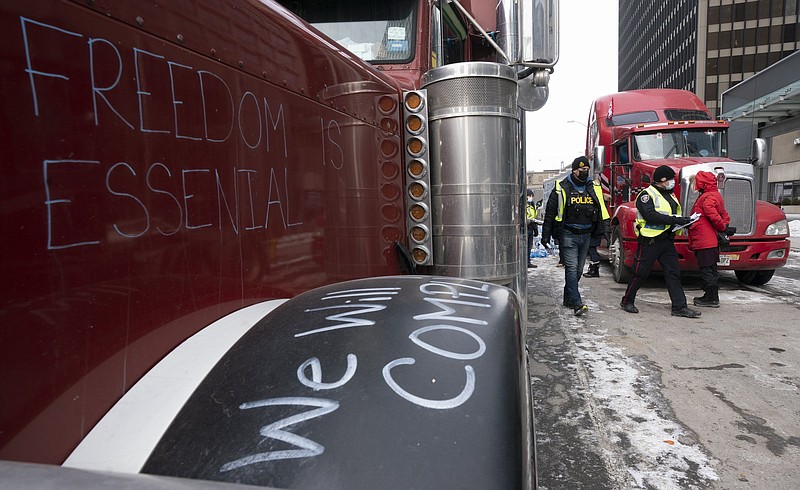OTTAWA, Ontario -- Police in the capital on Wednesday warned drivers in Ottawa's nearly three-week siege by truckers protesting the country's covid-19 restrictions to leave immediately or risk arrest.
The big rigs parked outside Parliament remained even after demonstrators abandoned their last truck blockade along the U.S. border.
With that, all border crossings were open for the first time in more than two weeks of unrest, centering attention on the capital, where many drivers defiantly ripped up warnings telling them to go home.
Authorities in yellow "police liaison" vests went from rig to rig, knocking on the doors and handing truckers leaflets informing them they could be prosecuted, lose their licenses and see their vehicles seized under Canada's Emergencies Act. Police also began ticketing vehicles.
One protester shouted, "I will never go home!" Some threw the warning into a toilet put out on the street. Protesters sat in their trucks and honked their horns in a chorus that echoed loudly downtown.
There was no immediate word from police on when or if they might move in to clear the hundreds of trucks by force.
The warnings came two days after Prime Minister Justin Trudeau invoked the emergency law to try to break the protests.
"It's not for politicians to tell police when and how to do things. What we have done with the emergency act is to make sure the police have the necessary tools," Trudeau said Wednesday.
Four protesters in Alberta have been charged with conspiracy to murder police officers, in connection with what police described as a plan to use violence if officers tried to break up a blockade in Coutts, a village in southern Alberta bordering Montana.
A stockpile of weapons was discovered by police in trailers in Alberta on Monday. Police said a small protest cell in the province had been prepared to use force to maintain the now disbanded blockade in Coutts, which began more than two weeks ago at a border crossing there.
Police officials said that early Monday, they had searched three trailers linked to a criminal organization connected to the Coutts protests and seized weapons, including 13 long guns, handguns, a machete, multiple sets of body armor, a large quantity of ammunition and magazines.
Some lawmakers are faulting Trudeau for not moving more decisively against the protests, while others are accusing him of going too far in assuming emergency powers.
The premiers of two Canadian provinces and 16 U.S. governors sent a letter to Trudeau and U.S. President Joe Biden calling on them to end their nations' vaccine mandates for truckers crossing the border.
The protests have drawn support from right-wing extremists and have been cheered on and received donations from conservatives in the U.S., triggering complaints in some quarters that America and its pandemic politics have been a bad influence on Canada.
Daniel Bulford, a protest leader who described himself as a former officer with the Royal Canadian Mounted Police and a recent member of Trudeau's security detail, accused the Trudeau government of resorting to "extreme and authoritarian" measures to quell the demonstrations.
On Wednesday, protesters who had stopped traffic and trade for a week along the U.S. border at Emerson, Manitoba, opposite North Dakota, pulled away in tractors and trucks without any arrests.
Protest organizers encouraged supporters to come to the capital to make it difficult for police to clear them out. But the nation's top safety official warned them to stay away or face legal consequences.
Over the past weeks, authorities hesitated to move against many of the protesters around the country, citing in some cases a lack of manpower and fears of violence.
As of Tuesday, Ottawa officials said 360 vehicles remained involved in the blockade in the city's core, down from a high of roughly 4,000.
"They don't want to give this up because this is their last stand, their last main hub," said Michael Kempa, a criminology professor at the University of Ottawa.
Stephanie Carvin, who once worked for Canada's domestic intelligence service and teaches national security at Carleton University in Ottawa, said police in the capital face a tricky situation. Some of the protesters are extremists, and police run the risk of violence if they try to disperse or arrest them, she said.
"The last thing we want is any kind of propaganda that can really feed the flames of this movement for years to come," Carvin said.
Information for this article was contributed by Robert Bumsted and Andrew Selsky of The Associated Press.

